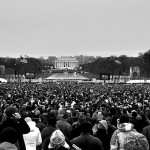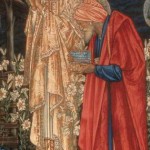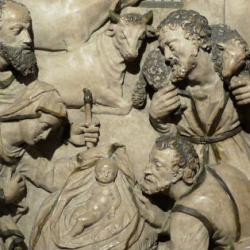National Geographic is not known for its religious fervor. That poses a problem when doing a series on the subject. For all the success of the New Atheists, a sceptical treatment would find a limited audience.
The channel appears to be after a larger market share, which prompts its own kind of fervor.
The Story of God has managed to cultivate a tone of gravitas about its subject without seriously investigating whether the true reverence of the believer, or the distasteful mockery of the scientistic devotee have any rational basis.
For many, the change in tone has been welcome.
The question is whether changing the tone has changed the channel.
How does The Story of God tell the story of God?
Choosing Morgan Freeman as its narrator and lead actor embodies the approach to the series.
Freeman exudes a natural warmth and folksy whimsy. Listening to him narrate is like receiving a gentleman’s invitation to lounge by a roaring fire in winter. It seems almost irreverent to refuse.
Freeman’s sonorous voice enchants; a wise and reasonable man invites us to embrace the wise and reasonable cause that he champions: celebrating the essential unity of religious experience, and becoming like him, a connoisseur of wonder.
Testimony to undifferentiated vocation
The first episode of Season two of The Story of God is based around the theme of divine calling. It is subtitled ‘The Chosen One.’
It is thus entirely appropriate that Freeman begins this episode with a personal anecdote. Like an evangelist, he relates to us the discovery of his own sense of vocation as an actor at the age of 8. Looking back as a celebrated master of his craft, he is winsome and wistful.
This connects him, and us, perfectly with the first vignette of the episode, the account of Jalue Dorje, a 9-year old living in Minnesota at the other end of life. Jalue is destined to become a great Buddhist spiritual leader, the reincarnation of a deceased lama who is said to have been returning to various bodies for five hundred years.
Jalue’s is but the first in a series of episodes linked by superficial resemblances. The varied cultural landscapes around the globe that follow are intoxicating; the locales are exotic; the religious practices verge from the sublime and threatening to the seemingly inexplicable. It is like leafing through one of their magazines.
The arrangement of the episodes has no particular narrative thread. The background of the stories serve to describe but not to critique. No overt case is being made.
This does not mean that the comparison is purposeless.
It is simply more artistic than scientific. It is not our rational faculties that are being called upon, but our imaginative.
A calling to syncretism
The ad for the episode notes that almost every faith has a figure its followers think was chosen by God, mentioning Islam, Christianity, and Judaism specifically.
Yet we do not look at the calling of those leaders, let alone compare them. We look at tributaries rather than the mainstream of these religions.
And the analogies made between the varied religious experiences of Buddhism, Christianity, Shia Islam, Sikhism, Daoism, and native spiritualty, while evocative, are wholly lacking in discrimination.
This seems to me extraordinary. If there is a God whose story is to be told, is it impossible to discover? Is the story of God a tale ‘full of sound and fury, signifying nothing’, but which it is impolite to assert?
It seems to me that by approaching the subject without due seriousness, National Geographic has thwarted the very possibility of telling the story of God.
It is the irreverence born of apathy. I find the lack of faith…disturbing.
The Narrative Thread
The key to understanding how we are to receive the message are the short bridges between the episodes.
There are uniformly Christian. There are brief scenes or images associating the Christian faith with something evoked by the vignettes: a picture of Jesus and a crown of thorns; a cross; the Church of the Holy Sepulchre; the Vatican; the towering presence of a church, with architecture ‘reminding us of the man upstairs’.
While these are familiar, the connection to the other religious expressions is deceptive. It is bad enough that, as C.S. Lewis once quipped, we end up like Scotsman who conclude that the Ancient Greek infantry must have been sound Presbyterians at heart because they wore kilts.
Worse yet is the fact that only Christianity claims that it follows a man not only chosen by God, but who was God.
His was, strictly speaking, the only story of God.
The episode not only misses the forest for the trees, it suggests every tree is a forest. This National Geographic series forgets that every map needs a legend to connect the dots.
Morgan Freeman is a legend. But he’s not enough to tell the story of God.
Season 2 of The Story of God begins on Monday, January 16.












